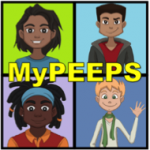Projects & Programs
Past Research
 We have developed research templates that are available for the community on the Research Resources Page.
We have developed research templates that are available for the community on the Research Resources Page.
CBPR Project: Research for Improved Health
NARCH Research Partnership “Research for Improved Health (RIH): A National Study of Community-Academic Partnerships” (U26IHS300009) funded through the Native American Research Centers for Health (NARCH V), National Institutes for Health (NIH) & Indian Health Service (2009-2013). This project was an in-depth investigation of promoters and barriers to Community Based Participatory Research (CBPR) in American Indian/Alaska...

My Peeps – Mobile-based Program for HIV Prevention in Young Males Who Have Sex with Males
MyPeeps is testing a mobile bast HIV prevention intervention for young men that have sex with men aged 13-18.
The Generations Project: Exploring Family Wellness and the Impact of Boarding Schools
This was a pilot grant to support research exploring the impact of Indian boarding schools on Native parents in the Northwest.
Health Survey of Two-Spirited Native Americans supplement: Trauma, Coping, and Health Outcomes Among HIV+ Native Americans
This supplement explores trauma, stress, coping, and alcohol and other drug use among HIV-positive American Indians.
Healthy Hearts Across Generations
The major goals of the study were to (a) conduct a qualitative study to determine Native experiences with food, nutrition, exercise and barriers and facilitators to a CVD prevention program; (b) survey a stratified random sample of 375 adult American Indians from tribal rolls to establish preliminary CVD and CVD-risk prevalence; (c) design a culturally...
NARCH V – Research for Change: Cross-Site Multi-cultural Community-Based Participatory Research
The causes of health disparities among communities of color and other underserved populations are complex and include social, biological, economic, cultural, and historical factors. A critical step in reducing health disparities among these communities is addressing the mistrust that characterizes community attitudes towards research and to ensure authentic community engagement in improving health. This study is an in-depth investigation of promoters and barriers to Community Based Participatory Research with the goal of improving health status and promoting health equity.
Caring for our Generations supplement: HIV/AIDS Supplement to Caring for our Generations
This project is a supplement to the Caring for Our Generations Project and explores risk and protective factors related to HIV/AIDS, Hepatitis-C, and other STIs.
Capacity Building from the Inside Out: Adapting the CITI Ethics Certification Training Module “Assessing Risk and Benefits” for American Indian Community Researchers
http://iwri.org/wp-content/uploads/2014/05/Consent-RETI-Stamped-Consent-form.pdf The overarching goal of the project is to strengthen research capacity and increase AIAN community involvement in NIH-funded research by developing and psychometrically validating a Collaborative IRB Training Initiative (CITI) training that is relevant, passable and accessible
Healthy Hearts Across Generations supplement: Diabetes and CVD risk Among American Indians in the Pacific Northwest
The major goal of the proposed supplement is to focus substantively on the role of diabetes in CVD risk and work towards reducing diabetes among this high-risk population.
Caring for our Generations
This project explored maternal health behaviors, maternal substance use, risk factors for substance use during and after pregnancy, and protective factors that support healthy maternal behaviors. This study had five aims: 1) Conduct qualitative formative research with mothers aged 18-55, Native health providers, elder/traditional healers, and Native youth; 2) Conduct survey interviews with community members to establish baseline data related to maternal health outcomes, protective health behaviors, risk factors for substance use during and after pregnancy, and social support for mothers; 3) Develop a culturally-based intervention targeting adult AI mothers in the Northwest; 4) Translate and disseminate the findings to the tribe and prepare translational materials for community members and service providers; and 5) Expand research infrastructure at Lummi Tribal Health Clinic and increase research capacity in the tribal community.
Next Page



